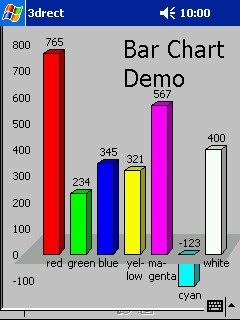A little bar chart
Summary
Richard Suchenwirth 2005-02-27: Looking at bar charts in magazines, I had the usual idea: I wanted to have them in Tcl too, and on the iPaq.
AM As of version 1.3, this is also part of Tklib's Plotchart
See Also
- A little pie chart
- Gear Animation
- A dynamic resizing version of this code is at
Description
So in this weekend fun project, I started with pseudo-3-dimensional bars - a rectangle in front as specified, embellished with two polygons - one for the top, one for the side:
proc 3drect {w args} {
if [string is int -strict [lindex $args 1]] {
set coords [lrange $args 0 3]
} else {
set coords [lindex $args 0]
}
lassign $coords x0 y0 x1 y1
set d [expr {($x1-$x0)/3}]
set x2 [expr {$x0+$d+1}]
set x3 [expr {$x1+$d}]
set y2 [expr {$y0-$d+1}]
set y3 [expr {$y1-$d-1}]
set id [eval [list $w create rect] $args]
set fill [$w itemcget $id -fill]
set tag [$w gettags $id]
$w create poly $x0 $y0 $x2 $y2 $x3 $y2 $x1 $y0 -fill [dim $fill 0.8] -outline black
$w create poly $x1 $y1 $x3 $y3 $x3 $y2 $x1 $y0 -fill [dim $fill 0.6] -outline black -tag $tag
}For a more plastic look, the fill color of the polygons is reduced in brightness ("dimmed"):
proc dim {color factor} {
foreach i {r g b} n [winfo rgb . $color] d [winfo rgb . white] {
set $i [expr int(255.*$n/$d*$factor)]
}
format #%02x%02x%02x $r $g $b
}Draw a simple scale for the y axis, and return the scaling factor:
proc yscale {w x0 y0 y1 min max} {
set dy [expr {$y1-$y0}]
regexp {([1-9]+)} $max -> prefix
set stepy [expr {1.*$dy/$prefix}]
set step [expr {$max/$prefix}]
set y $y0
set label $max
while {$label>=$min} {
$w create text $x0 $y -text $label -anchor w
set y [expr {$y+$stepy}]
set label [expr {$label-$step}]
}
expr {$dy/double($max)}
}An interesting sub-challenge was to round numbers very roughly, to 1 or maximally 2 significant digits - by default rounding up, add "-" to round down:
proc roughly {n {sgn +}} {
regexp {(.+)e([+-])0*(.+)} [format %e $n] -> mant sign exp
set exp [expr $sign$exp]
if {abs($mant)<1.5} {
set mant [expr $mant*10]
incr exp -1
}
set t [expr round($mant $sgn 0.49)*pow(10,$exp)]
expr {$exp>=0? int($t): $t}
}So here is my little bar chart generator. Given a canvas pathname, a bounding rectangle, and the data to display (a list of {name value color} triples), it figures out the geometry. A gray "ground plane" is drawn first. Note how negative values are tagged with "d"(eficit), so they look like they "drop through the plane".
proc bars {w x0 y0 x1 y1 data} {
set vals 0
foreach bar $data {
lappend vals [lindex $bar 1]
}
set top [roughly [max $vals]]
set bot [roughly [min $vals] -]
set f [yscale $w $x0 $y0 $y1 $bot $top]
set x [expr $x0+30]
set dx [expr ($x1-$x0-$x)/[llength $data]]
set y3 [expr $y1-20]
set y4 [expr $y1+10]
$w create poly $x0 $y4 [expr $x0+30] $y3 $x1 $y3 [expr $x1-20] $y4 -fill gray65
set dxw [expr $dx*6/10]
foreach bar $data {
lassign $bar txt val col
set y [expr {round($y1-($val*$f))}]
set y1a $y1
if {$y>$y1a} {swap y y1a}
set tag [expr {$val<0? "d": ""}]
3drect $w $x $y [expr $x+$dxw] $y1a -fill $col -tag $tag
$w create text [expr {$x+12}] [expr {$y-12}] -text $val
$w create text [expr {$x+12}] [expr {$y1a+2}] -text $txt -anchor n
incr x $dx
}
$w lower d
}#-- Generally useful helper functions:
proc max list {
set res [lindex $list 0]
foreach e [lrange $list 1 end] {
if {$e>$res} {set res $e}
}
set res
}
proc min list {
set res [lindex $list 0]
foreach e [lrange $list 1 end] {
if {$e<$res} {set res $e}
}
set res
}
proc swap {_a _b} {
upvar 1 $_a a $_b b
lassign [list $b $a] a b
}Testing the whole thing:
pack [canvas .c -width 240 -height 280]
bars .c 10 20 240 230 {
{red 765 red}
{green 234 green}
{blue 345 blue}
{yel-\nlow 321 yellow}
{ma-\ngenta 567 magenta}
{cyan -123 cyan}
{white 400 white}
}
.c create text 120 10 -anchor nw -font {Helvetica 18} -text "Bar Chart\nDemo"
#-- iPaq specialties - not needed in general
wm geometry . +0+0
bind . <Up> {exec wish $argv0 &; exit}SS: very nice, I wish there was a "porting" simple to use with CGI applications, i.e. generating an image.
JM 2005-06-21: If you feed the chart just with numbers less than 1. you will get an error caused by the incr being used with non-integer values.
instead of:
incr label -$step
use:
set label [expr $label - $step]
in the proc "yscale".
RS: Good hint - thanks, fixed above.
